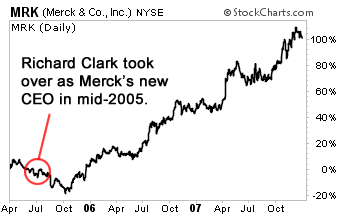The Market’s Next BIG Turnaround Story
If you’ve ever wanted to invest in the early stages of a corporate turnaround, read on.
Three of the companies below have already made money for investors who got in at the right time. And that’s precisely what makes the possibilities for the fourth company on the list so compelling. Let me explain…
Before Apple’s (Nasdaq: AAPL) Steve Jobs, there was Chrysler’s Lee Iacocca.
In the late 1970s, Chrysler (a public company at the time) was on the verge of bankruptcy. Freshly fired as president of Ford (NYSE: F), Iacocca proved to be more than up to the challenge of rescuing America’s third-largest automaker.
Iacocca’s first order of business in 1979 was to persuade Congress to provide federally backed loans to Chrysler, which at the time was deep under water from costly recalls of the Dodge Aspen and Plymouth Volare. Iacocca then engineered the launch of the highly popular K-Car line of small- to mid-sized cars in 1981, followed by the even more successful Dodge Caravan and Plymouth Voyager, the industry’s first minivans.
In 1983 Chrysler earned $925 million and was able to pay off the government-backed loans, with interest. By one account, shares of Chrysler were trading below $2.00 a piece in 1979; eight years later Chrysler declared a 3-for-2 stock split when shares were over $52.00.
Not as well-known but impressive in its own right is the bleeding that was stopped by Richard Clark at pharmaceutical giant Merck & Co. (NYSE: MRK).
In September 2004 Merck voluntarily recalled its $2.5-billion-a-year arthritis drug, Vioxx, because of links to heart attacks and strokes. Six weeks later Merck’s shares had fallen to a low of $25.60, down 60% from 18 months earlier.
Clark, a lifer at Merck, took over as president and CEO of this company in turmoil in May 2005. Over the next couple of years Clark streamlined operations, settled the Vioxx litigation and oversaw the launch of eight products. By late 2007 shares had rebounded to their pre-Vioxx highs, at levels almost double from the time Clark took the helm.
And how about those salads and apple slices at McDonald’s (NYSE: MCD)? That was the brainchild of James Cantalupo, who in 2003 came out of retirement to become CEO and reverse more than two years of slumping sales in the United States.
Cantalupo introduced a menu that appealed to a growing legion of health-conscious consumers — a strategy that quickly paid off. Net income in the first quarter of 2003 rose 29.4% from a year earlier, marking the beginning of a nine-year climb during which McDonald’s shares rose more than seven-fold.
In all three instances above, it was a change at the top that triggered the turnaround. Stock of the Month’s Amy Calistri refers to new leadership as “the catalyst everyone underestimates.” A new product line here, a revamp in operations there — for the right set of fresh eyes, a management change can prove illuminating for a company and rewarding for investors.
And in all three instances above, it didn’t take long for shareholders to reap the benefits of new leadership.
Is history about to repeat itself?
On Monday, Oct. 22, just hours before the debating presidential candidates kept us largely in the dark about their plans, a fledgling CEO was wowing Wall Street with hers.
The occasion was the first quarterly earnings conference call for Marissa Mayer, the 37-year-old former Google (Nasdaq: GOOG) wunderkind who last July became the fifth CEO of Yahoo (Nasdaq: YHOO) in the past four years. (You can read Mayer’s biography here.)
The world’s largest Internet portal had just released earnings for the third quarter that slightly beat analysts’ expectations. But no matter. As AdAge put it, “The financial results were the undercard to the main event: (Mayer’s) first public articulation of her plan for Yahoo, which hired her to breathe new life into a portal that’s been treading water for years.”
On Monday’s call, Mayer told analysts that Yahoo would emphasize mobile technology and personalized services going forward. Yahoo’s growth strategy also will include acquisitions of young startups that will help improve its products, rather than large deals, said Mayer. (You can listen to the call in its entirety by clicking here.)
The reviews were positive.

After peaking at $108.17 a share on the last day of 1999, Yahoo has floundered between $13 and $19 since January 2009. That’s why it’s a big deal that following the earnings call, Yahoo established new 52-week highs on consecutive days this week, closing Friday at $16.79.
Action to Take –> As is often the case, our Amy Calistri spotted this potential opportunity well before most others. Three weeks after Yahoo named Mayer as its new CEO, Amy named Yahoo as her “Stock of the Month” for August.
To be sure, three months won’t make a turnaround. But that’s the point. If you believe Yahoo is on the same course as Chrysler, Merck and McDonald’s, the time to act is now, in the early chapters of what could be the next big turnaround story.
[Editor’s note: A version of this appeared in StreetAuthority Insider, a subscriber-only publication sent to all StreetAuthority newsletter subscribers, free of charge.]
[Note: Amy’s hunt for winning investments doesn’t end with turnaround stories. A few months ago she uncovered a little-known investment that pays a 9% dividend yield… has doubled the performance of S&P 500 since the beginning of the year… and owns shares in some of the world’s fastest-growing companies. The best part? The government FORCES this company — and several others like it — to pay shareholders 90% of its profits. To learn more about Stock of the Month, and these stocks, click here now.]
